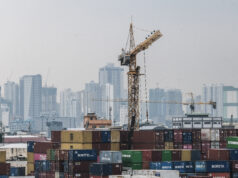PHL growth seen on track to 2017 target
THE PHILIPPINES is on track to hitting its economic growth goal this year, with improved public spending fueling faster expansion despite a slow start in the first quarter, analysts at Nomura Global Research said.
In a report released yesterday, the global bank said the Philippine economy can still achieve its 6.5-7.5% growth target for 2017, with faster budget releases seen to lift gross domestic product (GDP) growth.
Nomura expects a 6.7% expansion for the full year, partly on the back of an already-fast 6.4% climb recorded in the first quarter but slightly weaker than 2016’s 6.9% pace.
The Philippine Statistics Authority is scheduled today to report second-quarter GDP growth, which a BusinessWorld poll of economists late last week put at a 6.5% median and which Socioeconomic Planning Secretary Ernesto M. Pernia has said will likely approach seven percent. On Monday, Finance Undersecretary Gil S. Beltran said it was “possible” that GDP growth last quarter exceeded even seven percent.
Nomura said the 13.6% pickup in government spending — “led by capital expenditures” — seen last quarter, from just four percent in January-March, should have helped spur overall economic growth. “…[T]his effectively reversed the slow start to spending this year which… is typical after an election year,” the report read.
The government incurred a P154.5-billion deficit as of end-June, seven percent more than the P143.8-billion program for those six months and 28% bigger than the year-ago P120.3 billion, according to the Treasury bureau.
Noting that the budget deficit widened to 2.6% of GDP as of end-June, Nomura cited “a strong focus by the government on avoiding past problems of undershooting budget expenditures… [that] was particularly problematic during the early years of the previous administration.” The government of President Rodrigo R. Duterte capped this year’s budget shortfall at P478.1 billion, equivalent to 3.0% of GDP, which if realized would be wider than the actual P353.422 billion — 2.4% of GDP — recorded in 2016.
“… [T]hese fiscal developments continue to support our view that GDP growth will improve from 6.4% y-o-y in Q1 to 6.7% for full-year 2017,” Nomura said.
“More progress on infrastructure spending, which crowds in private investment, should continue to boost productivity and medium-term potential growth,” it added in its report.
Apart from the Philippines, Indonesia and Thailand are also expected to incur bigger fiscal deficits this year as the governments there spend more, particularly for capital formation.
“All these factors continue to support our view that, for these countries, the underlying quality of spending is generally improving towards more productive allocations that boost potential growth,” Nomura said. — Melissa Luz T. Lopez



